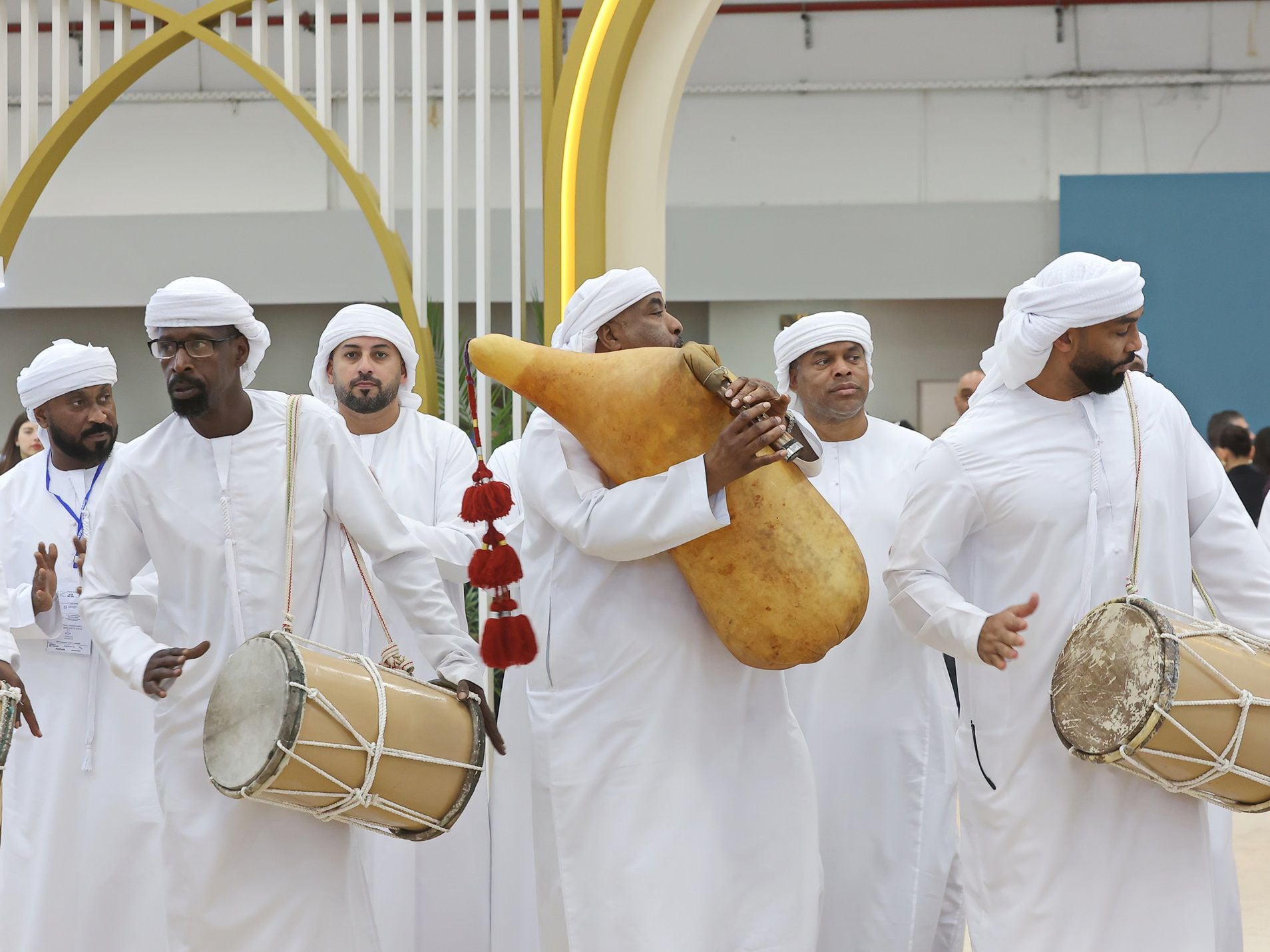
HOW THE SHARJAH NATIONAL BAND IS SPREADING EMIRATI CULTURE ALL OVER THE WORLD
The men, resplendent in pearl-white kanduras, face each other with bamboo canes at their sides. In the middle of the two rows is an ensemble of percussionists clasping a large double-sided drum called the Yowah. As the rhythms gain momentum and intricacy, the men sway and twirl their canes aloft while chanting expressions of joy and praise taken from classical Arabic Nabati poetry.
The Ayala dance, an art form on Unesco’s representative list of Intangible Cultural Heritage of Humanity, is a signature of UAE culture and heritage and regarded as an entry point into understanding its national identity.
This scene has played out in various forms internationally from Europe to South America courtesy of the Sharjah National Band. For over 20 years, this group of road warriors have been representing the UAE at various international culture and heritage festivals, drawing enthusiastic responses from eclectic crowds.
Last week, they were in the Greek port city of Thessaloniki as part of Sharjah’s participation in the city’s international book fair. In addition to performing daily at the fairgrounds, the band performed pop-up gigs in the city centre and the Central Library at Aristotle University of Thessaloniki Library.
“Different country and the same reaction,” beams artistic director Sultan Al Haleis. “The crowds are always curious at first and don’t know how to react, but once we are in full flow during the Ayala they begin to move, clap along and finally a few brave ones join us to dance before the others follow.”
Usually performed in momentous occasions, the Ayala is part of the vast catalogue of Emirati traditional dance the group performs.
Others include the Liwa, powered by the droning rhythms of the mizmar, a reed; the Haban which has the band dancing in a group of three; and the Harbiya which is defined by its melodious vocal refrains.
As well as designing the programme, Al Haleis also joins in the performances as a conductor, marauding across the stage to ensure the band’s vocals are pitch perfect and choreography is on point.
While vibrant and eye-catching, he states the shows are not done for entertainment. “Beyond the artistry, the main aim here is to spread our Emirati culture all over the world,” he says.
“These dances all have their own stories and context in which they are performed, but they are linked by this spirit of openness and hospitality. When we come to Greece or China, our performances are a way to say thank you for hosting us as well as being an invitation to come to the UAE.”
While the message has resonated from parks in Seoul to public squares of Sao Paulo – where Sharjah was the guest of honour at both respective book fairs – it has been continuously refined in Sharjah.
Established in 1998 by the Sharjah Institute of Heritage, the band has grown from 15 to 33 members and performs regularly at home in local cultural fairs and abroad in events featuring an official Sharjah presence. Evening rehearsals take place each week at the institute.
“You have to understand that most of the members work other jobs and they sacrifice their family to join us,” Al Haleis says. “What makes the group consistent, in my opinion, is that we are serving a greater goal of representing Sharjah and the UAE and not just playing for sheer commercial means.”
That focus is courtesy of the group being funded by the Sharjah Institute of Heritage, an official body from the emirate. “From what I understand we could be the only in-house governmental band in the UAE,” Al Haleis says.
“That support is really important and really comes from the vision of Sheikh Dr Sultan bin Muhammad Al Qasimi, the ruler of Sharjah. He always knew the importance of preserving our heritage and showcasing it to the world.”
If this sounds like a dream gig, the door is always open for the band to grow with more Emirati talent. “If you have the right attitude we will personally train you to become part of our family,” Al Haleisi says. “We want more Emiratis to join us. The only way we can keep our heritage alive is by passing it on to the next generation.”
2024-05-22T03:08:50Z dg43tfdfdgfd